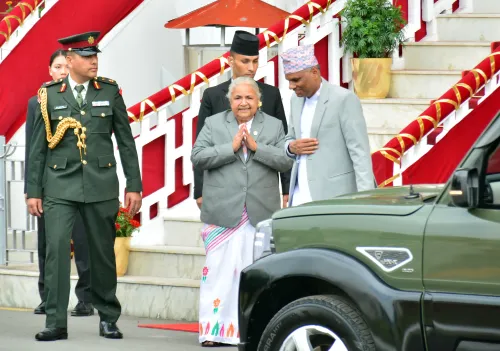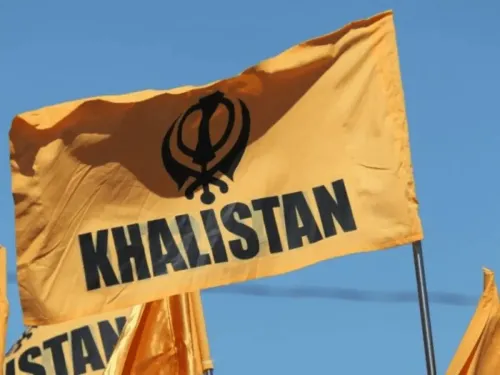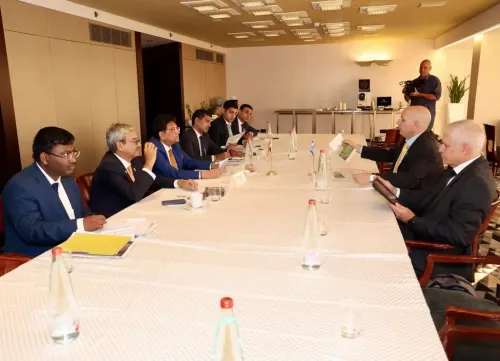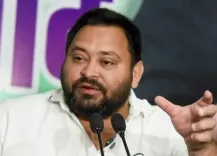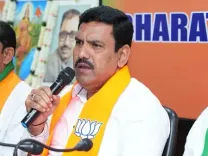Why Did Trump Target India with a 25% Tariff on Russian Oil?

Synopsis
Key Takeaways
- Trump's tariff on India is set at 25%.
- This raises India's total tariffs to 50%.
- India is targeted despite other nations purchasing Russian oil.
- India emphasizes energy security for its population.
- Potential for negotiations exists within a 21-day timeline.
Washington/New York, Aug 6 (NationPress) Just hours after a 24-hour ultimatum elapsed, US President Donald Trump unveiled a punitive 25 percent tariff on India for its purchases of Russian oil, effectively elevating the total tariffs imposed on India to 50 percent.
Despite other nations like China and Turkey also acquiring Russian oil, India is specifically targeted by this additional tariff.
The Indian government expressed that it is “extremely unfortunate” that the US has chosen to impose “additional tariffs on India for actions that several other countries are also taking in their own national interest.”
Earlier, the External Affairs Ministry indicated that both the US and the European Union are engaged in business transactions worth tens of billions of dollars with Russia.
In a statement released on Wednesday, it declared: “India will take all actions necessary to protect its national interests.”
India finds itself entangled in the tensions between Trump and Russia's President Vladimir Putin, as Trump seeks to economically pressure Russia through threats aimed at India, which imports 70 percent of its oil from Russia, with the intention of reducing its revenues.
This situation places India in a precarious position in Trump's efforts to compel Russia towards a ceasefire in its ongoing conflict with Ukraine.
Trump’s executive order specified that the additional tariffs would take effect in 21 days, but noted that he might reconsider the order if New Delhi ceased its purchases of Russian oil or if Moscow reached an agreement for a ceasefire with Ukraine.
However, the order also cautioned that the US would implement further punitive measures if either Russia or India retaliated.
In his ongoing tariff war, Trump announced last week that a 25 percent tariff on India would commence on Thursday.
Previously, Trump had accused India of re-exporting products made from Russian oil at inflated prices and profiting from these transactions.
He alleged that India was financing Russia’s military actions by providing significant cash flow through oil purchases.
“India is not only purchasing vast amounts of Russian oil; they are also reselling much of it on the open market for substantial profits. They seem indifferent to the number of lives lost in Ukraine due to the Russian war machine,” he stated on Truth Social.
Nevertheless, India clarified that “our imports are dictated by market conditions and are aimed at ensuring energy security for our 1.4 billion citizens.”
The imposition of tariffs on Russian oil coincides with Trump's Special Envoy Steve Witkoff holding discussions with President Putin and other officials in Moscow.
On Tuesday morning, Trump indicated that additional tariffs would be enforced on India within 24 hours, but the executive order was issued a couple of hours after the deadline had passed.
Later in the afternoon, he mentioned that he would wait to observe the outcome of the Witkoff-Putin discussions before finalizing the sanctions.
The three-hour meeting between Witkoff and Putin was described by Kremlin spokesperson Yuri Ushakov as a “rather useful and constructive conversation.”
Putin’s envoy for economic cooperation, Kirill Dmitriev, who was part of the discussions, shared on X: “Dialogue continues and is critical for global security and peace.”
Expressing optimism, he thanked his followers on X for their support for Witkoff’s visit to Moscow, asserting, “Dialogue will prevail.”
The 21-day period before the additional tariffs take effect offers a potential window for a ceasefire agreement or for India to halt its oil purchases.
By not sanctioning China, Trump appears to be safeguarding his ongoing trade negotiations with the nation.
Niki Haley, the former cabinet-level UN permanent representative who ran against Trump in the Republican presidential nomination, criticized the perceived double standard of singling out India, which could severely damage ties with an ally.
While acknowledging that “India should not be buying oil from Russia,” she pointed out that “China, an adversary and the top buyer of Russian and Iranian oil, received a 90-day tariff pause.”

